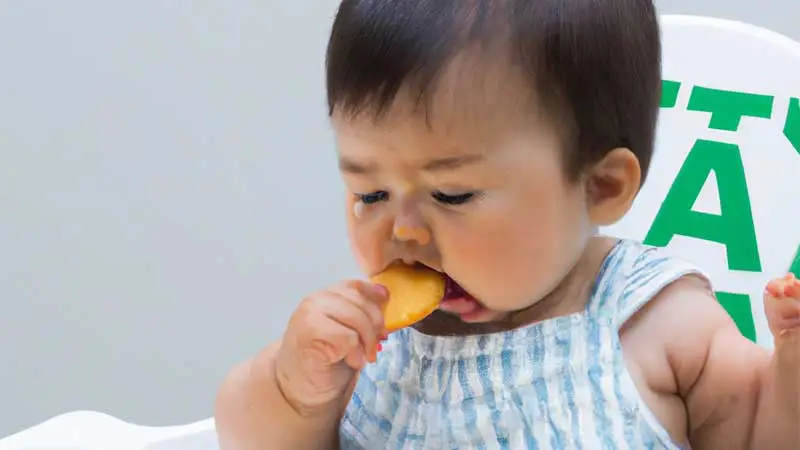Can A 1 Year Old Eat Junk Food? This is a common question among new parents, especially when navigating picky eating habits. At this age, toddlers are still developing their taste preferences and nutritional needs, so making the right food choices is essential for their health.
In short, junk food isn’t ideal for 1-year-olds. Highly processed foods with lots of sugar, salt, and unhealthy fats can interfere with their growth and development. Instead, focus on nutrient-dense foods like fruits, vegetables, and whole grains that support their active lifestyle.

In this article, we’ll discuss why junk food should be limited and share tips on fostering healthy eating habits for your child.
What is Junk Food?
Junk food is defined as any food that is high in calories and low in nutritional value. This can include salty snacks, sugary desserts, or fast food meals.
While these foods may be enjoyable to eat, they offer little in the way of nutrition and can be harmful to your health.
How Does Junk Food Affect the Body?
Consuming too much junk food can lead to weight gain and obesity. It can also increase your risk of developing chronic diseases like heart disease, stroke, and type 2 diabetes. In addition, eating junk food has been linked to poor mental health and academic performance in children and adolescents.
Is There Any Place for Junk Food in a Healthy Diet?
While you should limit your junk food intake, indulging in these foods occasionally is okay. Just be sure to balance them with plenty of healthy fruits, vegetables, whole grains, and lean protein sources. And always remember moderation is key!
The Effects of Junk Food on Young Minds and Bodies:
Junk food is often marketed to children and adolescents, and it can be hard for young people to resist the lure of these unhealthy foods. Unfortunately, junk food can negatively affect young minds and bodies.
Junk food is typically high in calories, sugar, and fat and often lacks important nutrients like vitamins, minerals, and protein.
Eating too much junk food can lead to weight gain and obesity, which can increase the risk of several serious health problems. Junk food can also contribute to tooth decay and problems with mood and concentration.
So, what can parents do to help their kids avoid the pitfalls of junk food?
Start by modeling healthy eating habits yourself! Set a good example by eating plenty of fruits, vegetables, whole grains, and lean protein.
And make sure your kids have access to healthy snacks like nuts or fruit instead of cookies or chips.
Finally, teach your kids about making smart food choices so they can make informed decisions when faced with tempting junk food options.
Nutrition For Toddlers: What Should You Feed a One-Year-Old?
As a parent, you might wonder if letting your one-year-old eat junk food is okay. After all, they probably see you eating it and want to try it themselves.
Here’s the thing: junk food is not good for developing brains. It can lead to problems with attention and behavior later in life.
So, what should you feed your one-year-old instead? Stick to nutrient-rich foods like fruits, vegetables, whole grains, and lean proteins. These will help them grow and develop properly.
Tips For Parents on Limiting Junk Food at Home

As a parent, you have a big influence on what kinds of foods your child eats. You can help them develop healthy eating habits by limiting the amount of junk food in your home. Try these tips to make sure your house is a haven for healthy eating:
1. Keep Junk Food Out of Sight
If you don’t have chips, cookies, and other junk food in your house, your child won’t be as tempted to eat them. Put unhealthy snacks out of sight, such as in high cabinets or the back of the pantry.
2. Don’t Buy Junk Food on Impulse
When you’re grocery shopping, stick to your list and don’t be tempted by unhealthy snacks at the checkout lane. If you buy junk food, keep it out of reach so you’re not as likely to eat it on a whim.
3. Encourage Healthy Snacking habits
Ensure your fridge and pantry have healthy snacks like fruits, vegetables, and whole-grain crackers. When your child is hungry, they’ll be more likely to reach for something nutritious if that’s all available.
4. Set a Good Example
Your child will learn from your eating habits, so it’s important to set a good example by consuming junk food only occasionally. When you do indulge, enjoy it mindfully and savor the moment.
5. Make Room for Special Treats
It’s okay to indulge in a treat occasionally, but make sure it’s an occasional occurrence. Set aside some room in your budget to allow for special treats like homemade chocolate chip cookies occasionally.
Conclusion
In conclusion, it is important to understand that while 1-year-olds can eat junk food in small quantities, the developing brain should be exposed to wholesome nutrition as much as possible.
For parents with children under five, reducing their exposure to dangerous chemicals and additives found in processed foods is paramount. Yes, you can let your little one indulge in the occasional treat but always strive for healthy eating habits first and foremost.
It is key to remember that the foundation of a healthy life starts in infancy. Offer healthy food options whenever you can, from minerals and vitamins to lean proteins.
Strive to create balanced meals with fresh fruits, vegetables, and complex carbohydrates that can stock their young bodies with essential nutrients.
Regular exercise is just as important – even for a 1-year-old –and should be part of their daily routine from the very beginning. On top of that, provide plenty of emotional support, love, and guidance during their critical early years to ensure a happy and successful future for your child.
I hope this article helped you understand the importance of physical, mental, and emotional development for 1-year-olds, as well as provided education about junk food consumption for those with young children. This information must be spread to ensure healthy and safe childhoods for all children.
